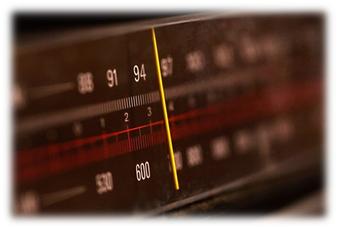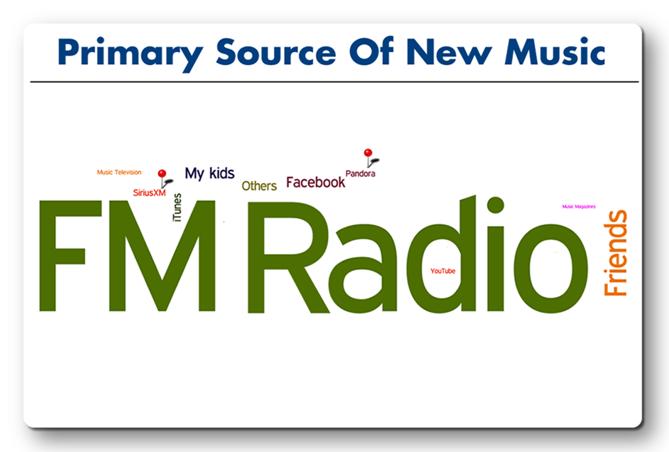If about half of your company’s sales leads came from one key source, something tells me that you’d do everything you could to keep that financial reservoir happy and healthy. When your best opportunity for exposure, sales, and word of mouth emanates from a single source, smart executives would most definitely laser focus on keeping that fire hose flowing.
But not when you’re talking about the music industry.
 In fact, over the last several years, the thinking among many music executives has been to demonize and attack that primary source of exposure, promotion, and discovery – the broadcast radio business.
In fact, over the last several years, the thinking among many music executives has been to demonize and attack that primary source of exposure, promotion, and discovery – the broadcast radio business.
The digital media revolution over the last decade has taken its toll on traditional media content creators – notably the once symbiotic relationship between the radio and music industries.
That new Nielsen Music 360 report reveals something that would be the easiest possible question on Family Feud: most people discover new music on the radio. Their 3,000 online survey consumers throughout the U.S. reveal that 48% find out about new music from radio, followed distantly by friends and relatives (10%), and YouTube (7%).
Rolling Stone’s Steve Knopper calls this new study “good news for the radio industry and also the record industry…” Well, maybe.
Michiganders may remember the lengths to which a fledgling Ann Arbor artist went to get his songs added to The Big 8 – CKLW in the early ‘70s. Bob Seger’s “Rosalie” was a laser shot plea to Rosalie Trombley, that station’s iconic music director (“She’s got the tower, she’s got the power”). By the way, CKLW never added the song.
>EMAIL RECIPIENTS: CLICK HERE TO WATCH CKLW VIDEO<
So who knew? Radio has the power to make hits? From Clive Davis to Ahmet Ertegun to Irving Azoff, anyone and everyone with a half a brain in the record industry knew how to get music discovered.
It’s radio, stupid.
Until now.
Pandora?
Sirius/XM?
Spotify?
Songza?
The hot new pure-play of the week?
All small potatoes in the big scheme of things.
This is nothing new. We ask the same question every year in our Techsurveys, and get virtually the same results as Nielsen. If you want to successfully expose your music, you’d better get it on the radio.
Go ahead, cover your left eye and tell me the biggest words you see on the word cloud.
But the music industry’s relentless attack on radio has not abated.
So here’s an idea for the label community….
Stop trying to shake down radio and work together to build (and rebuild) artist brands, great songs, the concert business, and merchandise sales.
Stop pouring money into minor league exposure sources like satellite radio and Pandora, and fish where the fish are.
Work with your artists to provide radio with listener and social experiences that they cannot get anywhere else.
Oh, and one more thing – the Nielsen study, Techsurvey8, and every other research survey shows that music consumption is migrating to mobile devices. Radio station apps, according to Nielsen, are now used by half of those who have smartphones. Our survey indicates that percentage runs even higher.
So the radio and records relationship has a great past. But it also has a potentially great future.
But only if the two industries work together to create marketing programs that facilitate discovery, consumption, and enjoyment.
This isn’t Congress. So, what’s so hard about that?
- What To Do If Your Radio Station Goes Through A Midlife Crisis - April 25, 2025
- A 2020 Lesson?It Could All Be Gone In A Flash - April 24, 2025
- How AI Can Give Radio Personalities More…PERSONALITY - April 23, 2025





The music industry seems to be willing to forgo all of the positive potential that you cite in order to get a performance royalty. It’s become like a nasty political campaign, where they’ve actually come out and proclaimed that radio doesn’t sell music anymore.
The problem is that this is a fight (at least potentially) for survival for both parties – and radio doesn’t seem to realize that its a fight, much less the importance of it. The music industry fights hard, mean and they are used to winning. Plus, they aren’t always that smart – they’ve been known to act against their self interest, but they rarely back down and they have little experience with negotiation.
Radio has many tools at their disposal – everything from the types of partnerships/alliances you suggest, to a rough PR campaign using its own free airwaves, to calling the music industry’s bluff and selectively not playing new releases to things like “no new music” Mondays.
Radio should gear up for the fight of its life then let the music industry know through some back channel that its doing so. Then propose something that would dramatically reduce both the costs and restrictions on streaming in exchange for a reasonable performance royalty and the kind of co-promotions Fred suggests here. If they (the music industry) won’t go along, it would probably make sense to start the PR war. Most people like or love radio and most dislike or hate the music industry. That’s a nice place from which to start.
Radio has multiple revenue streams, but as the car dashboard evolves toward media source neutrality, streaming will become more and more important. Much more important than cell phone chips or HD radio.
The music biz can fight mean and dirty. This is no time to be a fish in a shark tank.
What’s the saying about “Dont bring a knife to a gun fight?” You’ve hit on some of the elements that are preventing an accord from occurring, despite the problems that both industries face. The music business desperately needs to develop franchises and brands in order to justify why a band should even bother signing with a label. And radio could use some of the artist and music exclusivity it once had, especially when bands came to town and had an album to promote. Despite their many options, consumers “get” how this works. It is a missed opportunity for both the radio and music communitieis. Thanks for the clarity, Bob.